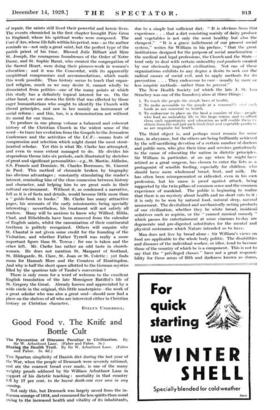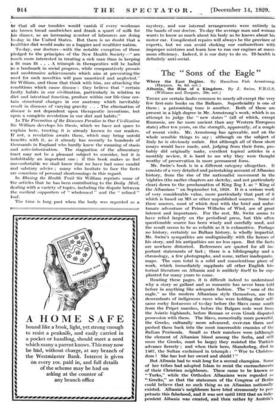Good Food v. The Knife and Bottle Cult
The Prevention of Diseases Peculiar to Civilization. By Sir W. Arbuthnot Lane. (Faber and Faber. 5s.)
THE Spartan simplicity of Danish diet during the last year of the War, when the people of Denmark were severely rationed, and ate the coarsest bread ever made, is one of the many weighty proofs adduced by Sir William Arbuthnot Lane in support of his dietetic teaching : mortality in that country fell by 11' per cent. to the lowest death-rate ever seen in any country.
Not only this, but Denmark was largely saved from the in- fluenza scourge of 1918, and consumed far less spirits than usual owing to the increased health and vitality of its inhabitants, due to a simple but sufficient diet. " It is obvious from MS experience . . . that a diet consisting mainly of dairy produce and vegetables is not only the most healthy but also the cheapest." "It is a grave indictment of our present social system," writes Sir William in his preface, " that the great institutions designed for the purpose of social amelioration- - the medical and legal professions, the Church and the State—: tend only to deal with certain unhealthy end-products created by our obviously imperfect civilization. Not one of these organizations exhibits to any degree a desire to seek out the radical causes of social evil, and to apply methods for its prevention . . . They endeavour to cure--usually by more or less empiric methods—rather than to prevent."
The New Health Society -(of which the late J. St. Lou Strachey was one of the founders) aims at three things : -
1. To teach the people the simple laws of health.
2. To make accessible to the people at a reasonahk' cost such foods as are essential to health.
3. To endeavour to place on the land a number of tlio:1 people who lead an unhealthy life in the large towns, and to afford them such opportunity and education as will enable them to obtain from the soil just such fresh fruit and vegetablo products as are requisite for health.
The third object is, and perhaps must remain for some time, in abeyance, but the others are being brilliantly achieved by the self-sacrificing devotion of a certain number of doctors and public men, who give their time and services gratuitously to the cause of educating the nation in dietetic principles. Sir William in particular, at an age when he might have retired as a great surgeon, has chosen to enter the lists as a protagonist of sensible feeding, especially for children, who should have more wholemeal bread, fruit, and milk. He has often been misrepresented or ridiculed, even in his own profession, but his cause is proof against attack, being supported by the twin pillars of common sense and the common experience of mankind. The public is beginning to realize that there is no mystery about health and no short cuts to it : it is only to be won by natural food, natural sleep, natural amusement. The devitalized and mechanically-acting products of our civilization, whether they be white bread, insidious sedatives such as aspirin, or the " canned musical comedy " which passes for entertainment at some cinemas to-day are degenerate and pre-digested substitutes for the mental and physical sustenance which Nature intended us to have.
Man does not live by bread alone : Sir William's views on food are applicable to the whole body politic. The disabilities and diseases of the individual worker, or idler, tend to become those of the country of which he is a component. This is not to say that the " privileged classes " have not a great responsi- bility for those areas of filth and darkness known as slums,
br that all our troubles would vanish if every workman ate brown bread sandwiches and drank a quart of milk for his dinner, as an increasing number of labourers are doing to-day in the United States. But there is no doubt that a healthier diet would make us a happier and wealthier nation.
To-day, our doctors—with the notable exception of those pledged to the principles of the New Health Society—" are Much more interested in treating a sick man than in keeping a fit man fit . . . i triumph in therapeutics will be hailed las a landmark in social progress, while comparatively prosaic and unobtrusive achievements which aim at preventing the need for such novelties will pass unnoticed and neglected." Sir William, and those that think with him, are attacking the conditions which cause disease : they believe that " certain faulty habits in our civilization, particularly in relation to diet and intestinal function, produce within our life-time cer- tain structural changes in our anatomy which inevitably result in diseases of varying gravity . . . The elimination of disease is not dependent upon therapeutic inventions, but upon a complete revolution in our diet and habits."
In The Prevention of the Diseases Peculiar to Our Civilization Sir William develops his thesis, which we have not space to explain here, trusting it is already known to our readers. If not, a revelation awaits them, which may bring untold benefits with it, as it already has recently to hundreds of thousands in England who hardly knew the meaning of stasis and auto-intoxication. The stagnation of the alimentary tract may not be a pleasant subject to consider, but it is indubitably an important one : if this book makes us feel uncomfortable we shall know that we have had some candid and salutary advice ; many who hesitate to face the facts are conscious of personal shortcomings in this regard.
In Blazing the Health Trail Sir William reprints some of the articles that he has been contributing to the Daily Mail, dealing with a variety of topics, including the dispute between the medical supporters of " wholemeal " and the " refined " loaf.
The time is long past when the body was regarded as a mystery, and our internal arrangements were entirely in the hands of our doctor. To-day the average man and woman wants to know as much about his body as he knows about his motor car. Complicated repairs will always be the province of experts, but we can avoid choking our carburettors with improper mixtures and learn how to run our engines at maxi- mum efficiency. Indeed, it is our duty to do so. Ill-health is definitely anti-social.













































 Previous page
Previous page